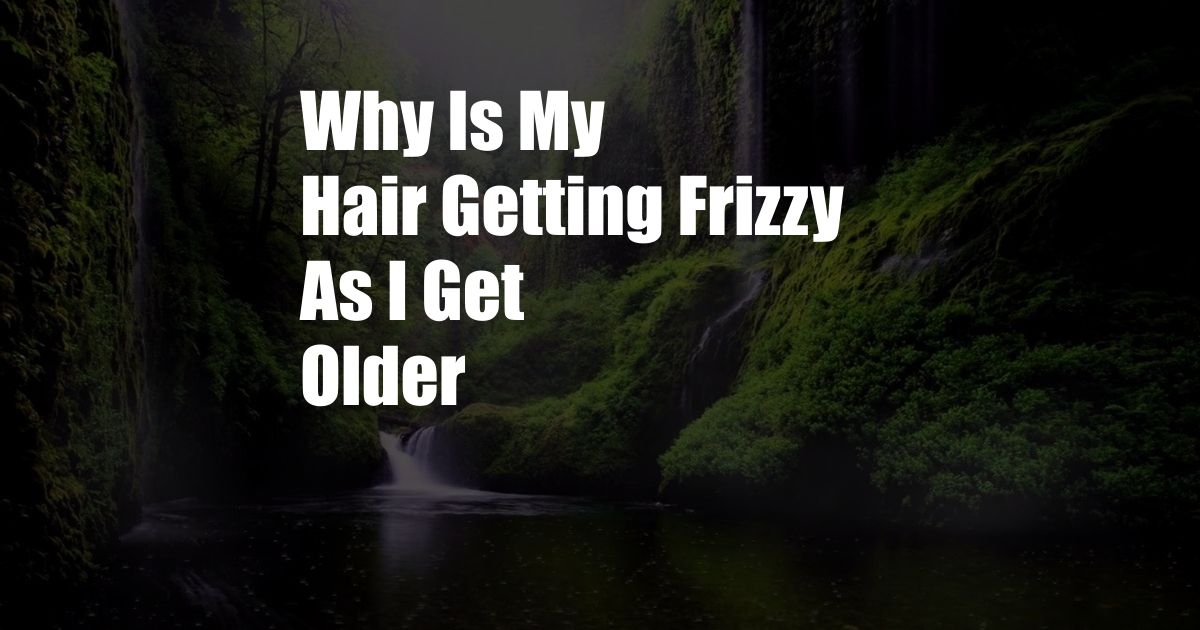
Why Is My Hair Getting Frizzy as I Get Older?
I remember the days when my hair was smooth and shiny. I could brush it easily and it would look great all day long. But as I’ve gotten older, my hair has become increasingly frizzy. It’s dry, it tangles easily, and it’s just not as manageable as it used to be. What’s going on?
It turns out that there are a number of reasons why hair can become frizzy as we age. Let’s take a closer look at some of these factors and what you can do to combat them.
Aging and Hair Changes
As we age, our hair goes through a number of changes. First, the hair shaft becomes thinner. This is because the production of collagen and elastin, two proteins that give hair its strength and elasticity, slows down as we age. As a result, the hair shaft becomes more fragile and prone to breakage.
Second, the hair follicle shrinks as we age. This means that there is less room for the hair shaft to grow out, which can lead to shorter, thinner hair. Additionally, the sebaceous glands, which produce oil to lubricate the hair, become less active as we age. This can lead to dry, brittle hair.
Hormonal Changes and Hair
Hormonal changes can also play a role in hair frizz. Estrogen, a hormone that is produced in large amounts during the reproductive years, helps to keep hair smooth and shiny. However, as women go through menopause, estrogen levels decline. This can lead to drier, frizzier hair.
Other Factors that Contribute to Frizz
In addition to aging and hormonal changes, there are a number of other factors that can contribute to frizzy hair. These include:
- Over-washing: Washing your hair too often can strip it of its natural oils, leading to dryness and frizz.
- Using the wrong hair products: Using harsh shampoos, conditioners, and styling products can damage the hair shaft and lead to frizz.
- Heat styling: Using heat styling tools, such as blow dryers and flat irons, can damage the hair shaft and lead to frizz.
- Chemical treatments: Chemical treatments, such as perms and relaxers, can damage the hair shaft and lead to frizz.
- Sun exposure: UV rays from the sun can damage the hair shaft and lead to frizz.
Tips for Managing Frizzy Hair
If you’re dealing with frizzy hair, there are a number of things you can do to manage it. Here are a few tips:
- Use gentle shampoos and conditioners: Choose shampoos and conditioners that are designed for dry, frizzy hair. These products will help to cleanse the hair without stripping it of its natural oils.
- Avoid over-washing: Wash your hair no more than twice a week. Over-washing can strip the hair of its natural oils, leading to dryness and frizz.
- Use a leave-in conditioner: Leave-in conditioners can help to moisturize and smooth frizzy hair. Apply a leave-in conditioner to damp hair after washing.
- Avoid heat styling: If possible, avoid using heat styling tools on your hair. Heat can damage the hair shaft and lead to frizz.
- Protect your hair from the sun: Wear a hat or scarf to protect your hair from the sun’s UV rays.
Conclusion
If you’re dealing with frizzy hair, you’re not alone. Many people experience frizzy hair as they get older. However, there are a number of things you can do to manage frizzy hair and keep your hair looking its best. By following the tips above, you can tame your frizz and achieve smooth, shiny hair.
Do you have any other tips for managing frizzy hair? Share them in the comments below!
FAQ
Why is my hair getting frizzy as I get older?
There are a number of reasons why hair can become frizzy as we age. These include:
- Aging: As we age, the hair shaft becomes thinner and the hair follicle shrinks. This can lead to shorter, thinner hair that is more prone to frizz.
- Hormonal changes: Estrogen, a hormone that is produced in large amounts during the reproductive years, helps to keep hair smooth and shiny. However, as women go through menopause, estrogen levels decline. This can lead to drier, frizzier hair.
What can I do to manage frizzy hair?
There are a number of things you can do to manage frizzy hair. Here are a few tips:
- Use gentle shampoos and conditioners: Choose shampoos and conditioners that are designed for dry, frizzy hair. These products will help to cleanse the hair without stripping it of its natural oils.
- Avoid over-washing: Wash your hair no more than twice a week. Over-washing can strip the hair of its natural oils, leading to dryness and frizz.
- Use a leave-in conditioner: Leave-in conditioners can help to moisturize and smooth frizzy hair. Apply a leave-in conditioner to damp hair after washing.
- Avoid heat styling: If possible, avoid using heat styling tools on your hair. Heat can damage the hair shaft and lead to frizz.
- Protect your hair from the sun: Wear a hat or scarf to protect your hair from the sun’s UV rays.